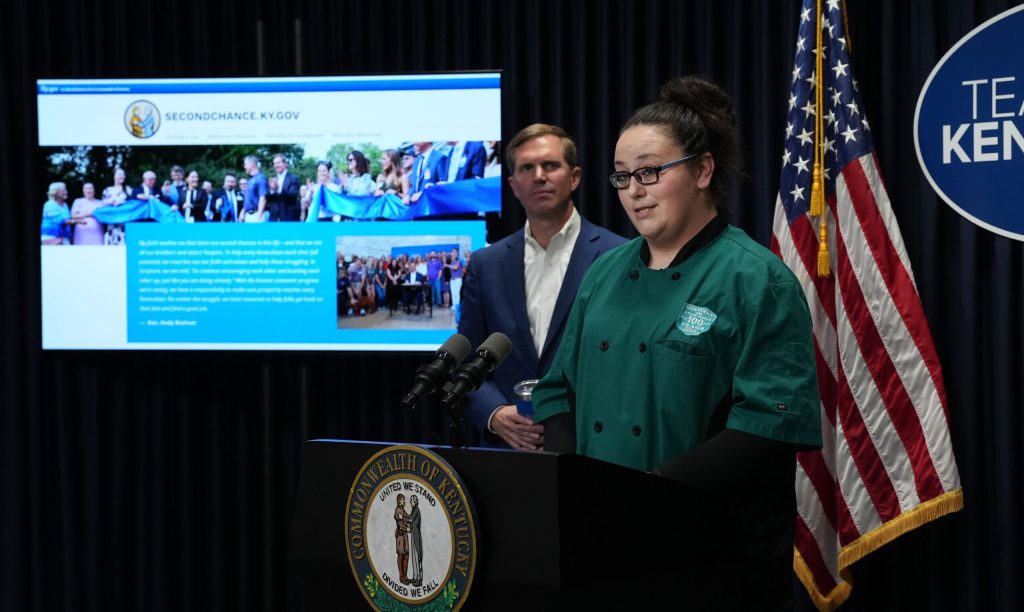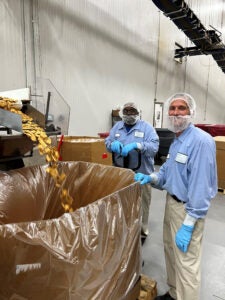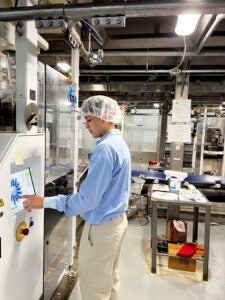Kentucky employers give second chances
Published 10:28 am Monday, June 17, 2024

- Sarah Young, a second chance employee at Kentucky Dam Village Park, speaks at a Team Kentucky presser in Frankfort.
When Barbara Aker’s nephew was 10 or 11, he broke his arm. A painkiller prescription set him off on a slippery slope, she said.
He eventually overdosed and died.
Now, through a Kentucky program aimed at reducing recidivism, Aker is making something good out of something bad.
A few months ago, the state launched a one-stop shop website for people leaving incarceration – www.secondchance.ky.gov.
The website includes resources for finding a job, getting an education and treatment for drug or substance abuse.
One of the many included resources is the Fair Chance Academy. Businesses can apply to attend a three-day training on how to adopt a Fair Chance workplace that is welcoming and beneficial to people leaving incarceration.
The first Fair Chance Academy launched in May 2022, and since, about 100 Kentuckians have participated. Aker is one of the first cohort’s graduates.
Aker is family pride director for More than a Bakery in Versailles, which has made some changes since it became a Second Chance employer.
“Every place I’ve ever worked, you had the seven-year criminal record look back, and we would never consider people that have felonies in the past,” she said.
But after the Fair Chance Academy, Aker led the charge to change the bakery’s attendance system to account for employees – or as they’re referred to at More than a Bakery, family members – reintegrating into society.
Meetings with parole officers, court-mandated drug screenings and other appointments didn’t mesh well with the bakery’s attendance policy, leaving formerly incarcerated people behind.
“So we had to really look at how we could tweak that program and work with that schedule, so as long as they can bring back the documentation and show that, we’ll support it” Aker said.

Second chance employees work at More than a Bakery in Versailles, Kentucky.

Aker also paired mentors with Second Chance employees to help them assimilate the responsibilities and socialization of the job. Due to early justice system involvement, some had their first jobs in jail.
There was no pushback among bakery family members, Aker said. Everyone was “warm and welcoming.”
“I don’t care what somebody’s past was, I care what their future is,” she said. “And that’s why we tell people when they come in, I want to know your story. I want to know how you got where you are and what you’re going to do to move forward in life.”
The Fair Chance Academy was “eye-opening,” Aker said. Cohort members had to go through a simulation of what it was like to leave incarceration and try to complete a series of tasks, like getting a drug screening, acquiring food stamps and finding a bus pass in order to find a job.
“You had to go through all these steps, and I ended up back in jail twice in the simulation, just trying to make it on a daily basis,” Aker said.
The Kentucky Dam Village Park is also a Second Chance employer. Manager Scot Ratzlaff said there are two prisons just down the road, and he’s always wondered about the people who leave.
“You go, ‘OK, how do they get their legs under them? How do they actually figure out what they’re going to do with their lives so they don’t go back?’ ” he said. “And that’s always been a concern of mine.”
Ratzlaff just hired their third Second Chance employee. Sarah Young was the first, hired as a cook through the reentry program. She said the job allows her to prove she is “no longer what (her) criminal record says.”
“Now instead of wondering which restaurant might hire me, my future is secured and I owe it all to this program,” Young added.
Just like many hospitality businesses coming out of the pandemic, state parks are facing a worker shortage. Ratzlaff saw second chance employment as an opportunity to provide a safe and secure environment for guests, while reducing recidivism.
“When somebody comes here, they need to feed the family, they need to feed themselves, they need clothing, they need life experience,” he said. “And if you talk to the individuals we have working here with us, they’re just very excited to be able to get into a real life experience that will keep them from going back.”
Both Aker and Ratzlaff emphasized that they take a close look at job candidates, just like they would for any other applicant. They consider the culture and skill fit, and the safety of their workplace.
Although it’s too late for her nephew, Aker said she thinks the reentry programs she’s involved in now would have benefitted him.
“On a personal level, it gave me back the hope that I was missing after I lost my nephew,” she said. “It was tough, and I feel like this was my chance to kind of honor him and hope we can help somebody like him.”





